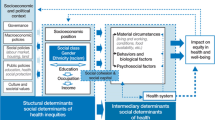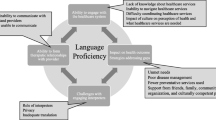Abstract
Understanding the immigrant experience accessing healthcare is essential to improving their health. This qualitative study reports on experiences seeking healthcare for three groups of immigrants in Toronto, Canada: permanent residents, refugee claimants and undocumented immigrants. Undocumented immigrants who are on the Canadian Border Services Agency deportation list are understudied in Canada due to their precarious status. This study will examine the vulnerabilities of this particular subcategory of immigrant and contrast their experiences seeking healthcare with refugee claimants and permanent residents. Twenty-one semi-structured, one-on-one qualitative interviews were conducted with immigrants to identify barriers and facilitators to accessing healthcare. The open structure of the interviews enabled the participants to share their experiences seeking healthcare and other factors that were an integral part of their health. This study utilized a community-based participatory research framework. The study identifies seven sections of results. Among them, immigration status was the single most important factor affecting both an individual’s ability to seek out healthcare and her experiences when trying to access healthcare. The healthcare seeking behaviour of undocumented immigrants was radically distinct from refugee claimants or immigrants with permanent resident status, with undocumented immigrants being at a greater disadvantage than permanent residents and refugee claimants. Language barriers are also noted as an impediment to healthcare access. An individual’s immigration status further complicates their ability to establish relationships with family doctors, access prescriptions and medications and seek out emergency room care. Fear of authorities and the complications caused by the above factors can lead to the most disadvantaged to seek out informal or black market sources of healthcare. This study reaffirmed previous findings that fear of deportation forestalls undocumented immigrants from seeking out healthcare through standard means. The findings bring to light issues not discussed in great depth in the current literature on immigrant health access, the foremost being the immigration status of an individual is a major factor affecting that person’s ability to seek, and experience of, healthcare services. Further, that undocumented immigrants have difficulty gaining access to pharmaceuticals and so may employ unregulated means to obtain medication, often with the assistance of a doctor. Also, there exists two streams of healthcare access for undocumented immigrants—from conventional healthcare facilities but also from informal systems delivered mainly through community-based organizations. Finally, within the umbrella term ‘immigrant’ there appears to be drastically different healthcare utilization patterns and attitudes toward seeking out healthcare between the three subgroups of immigrants addressed by this study.
Similar content being viewed by others
References
Feldmann CT, et al. Afghan refugees and their general practitioners in the Netherlands: to trust or not to trust? Sociol Health Illn. 2007;29(4):515–35.
MacFarlane A, et al. Arranging and negotiating the use of informal interpreters in general practice consultations: experiences of refugees and asylum seekers in the west of Ireland. Soc Sci Med. 2009;69(2):210–4.
O’Donnell CA, et al. “They think we’re OK and we know we’re not”. A qualitative study of asylum seekers’ access, knowledge and views to health care in the UK. BMC Health Serv Res. 2007;7:75.
Bhatia R, Wallace P. Experiences of refugees and asylum seekers in general practice: a qualitative study. BMC Family Pract. 2007;8:48.
Nandi A, et al. Access to and use of health services among undocumented Mexican immigrants in a US urban area. Am J Pub Health. 2008;98(11):2011–20.
Kullgren JT. Restrictions on undocumented immigrants’ access to health services: the public health implications of welfare reform. Am J Pub Health. 2003;93(10):1630–3.
Perez-Rodriguez MM, et al. Demand for psychiatric emergency services and immigration. Findings in a Spanish hospital during the year 2003. Eur J Pub Health. 2006;16(4):383–7.
MigHealthNet. Refugees and asylum seekers - Entitlement to care & News on the Entitlement of Failed Asylum Seekers and Undocumented Migrants to Health Care Services. 2011. Available from: http://mighealth.net/uk/index.php.
Magalhaes L, Carrasco C, Gastaldo D. Undocumented migrants in Canada: a scope literature review on health, access to services, and working conditions. J Immigr Minor Health. 2010;12(1):132–51.
Papademetriou DG. The global struggle with illegal migration: no end in sight. Washington: Migration Policy Institute; 2005.
Ontario Government. Immigrating to Ontario, Healthcare Commonly Asked Questions. 2012. Available from: http://www.ontarioimmigration.ca/en/questions/OI_QUESTIONS_COMMON.html#_Health5.
Hargreaves S, et al. Impact on and use of health services by international migrants: questionnaire survey of inner city. BMC Health Serv Res. 2006;6:153.
Greenwood DJ, Whyte WF, Harkavy I. Participatory action research as a process and as a goal. Hum Relat. 1993;46(175).
Minkler M, et al. Community-based participatory research: implications for public health funding. Am J Pub Health. 2003;93(8):4.
Koch T, Kralik D. Participatory action research in health care. Hoboken: Blackwell Publishing Ltd; 2006.
MacFarlane A, Dzebisova Z, Karapish D. Arranging and negotiating the use of informal interpretaters in general practice consultations: experience of refugees and asylum seekers in the west of Ireland. Soc Sci Med. 2009;69:210–4.
Costantino G, Malgady RG, Primavera LH. Congruence between culturally competent treatment and cultural needs of older Latinos. J Consult Clin Psychol. 2009;77(5):941–9.
Cabassa LJ, Zayas LH. Latino immigrants’ intentions to seek depression care. Am J Orthopsychiatry. 2007;77(2):231–42.
Green EH, et al. Pap smear rates among Haitian immigrant women in eastern Massachusetts. Pub Health Rep. 2005;120(2):133–9.
Carroll J, et al. Caring for Somali women: implications for clinician-patient communication. Patient Educ Couns. 2007;66(3):337–45.
Kitto SC, Chesters J, Grbich C. Quality in qualitative research. Med J Aust. 2008;188:243–6.
Kvale S, Brinkmann S. Interviews: Learning the Craft of Qualitative Research Interviewing. 2nd ed. California: SAGE Publications; 2009.
Javier RA. Linguistic considerations in the treatment of bilinguals. Psychoanal Psychol. 1989;6(1):87–96.
Javier RA. The Bilingual mind: thinking, feeling and speaking in two languages (cognition and language: a series in psycholinguistics). Queens: Springer Science+Business Media; 2007.
Hsieh H-F, Shannon SE. Three approaches to qualitative content analysis. Qual Health Res. 2005;15(9):1277.
Canada Border Services Agency. The Canada Border Services Agency. 2011. Available from: http://www.cbsa-asfc.gc.ca/menu-eng.html.
Rue M, et al. Differences in pharmaceutical consumption and expenses between immigrant and Spanish-born populations in Lleida, (Spain): a 6-months prospective observational study. BMC Health Serv Res. 2008;8:35.
Reijneveld SA. Reported health, lifestyles, and use of health care of first generation immigrants in The Netherlands: do socioeconomic factors explain their adverse position? J Epidemiol Community Health. 1998;52(5):298–304.
Reijneveld S, et al. Contacts of general practitioners with illegal immigrants (Netherlands). Scand J Pub Health. 2001;29(4):308–13.
Sullivan TM, Sophia N, Maung C. Using evidence to improve reproductive health quality along the Thailand-Burma border. Disasters. 2004;28(3):255–68.
MacFarlane A, et al. Responses to language barriers in consultations with refugees and asylum seekers: a telephone survey of Irish general practitioners. BMC Family Pract. 2008;9:68.
Harmsen JAM, et al. Patients’ evaluation of quality of care in general practice: what are the cultural and linguistic barriers? Patient Educ Couns. 2008;72(1):155–62.
Ingram J. The health needs of the Somali community in Bristol. Community Practitioner. 2009;82(12):26–9.
Acknowledgments
I offer my deepest thanks to all of the participants in this study. I am indebted to your strength, resilience and willingness to share openly in order that others can learn from your experiences. I thank the community-based organization for welcoming me into their confidence and allowing this research study to take place. Thank you to Dr. Thomas Stewart and Mr. Joseph Mapa for their support of this study. Angela Robertson played a pivotal role in this research study and I am grateful for her on-going guidance through every stage. I am also indebted to the reviewer for the Journal of Immigrant and Minority Health who critiqued this manuscript, your suggestions significantly improved the caliber of the paper.
Author information
Authors and Affiliations
Corresponding author
Additional information
RC conducted all one-on-one interviews with study participants and worked with the community-based organization to plan the research study. BH, DF and SK assisted RC with the study and interview design. RC and BH coded the transcripts. SK guided the study framework and the method of analyzing data. RC wrote the manuscript, with input and comments from all authors. AK was responsible for helping RC shape the manuscript into a comprehensive document. All authors read and approved the final version.
Rights and permissions
About this article
Cite this article
Campbell, R.M., Klei, A.G., Hodges, B.D. et al. A Comparison of Health Access Between Permanent Residents, Undocumented Immigrants and Refugee Claimants in Toronto, Canada. J Immigrant Minority Health 16, 165–176 (2014). https://doi.org/10.1007/s10903-012-9740-1
Published:
Issue Date:
DOI: https://doi.org/10.1007/s10903-012-9740-1




